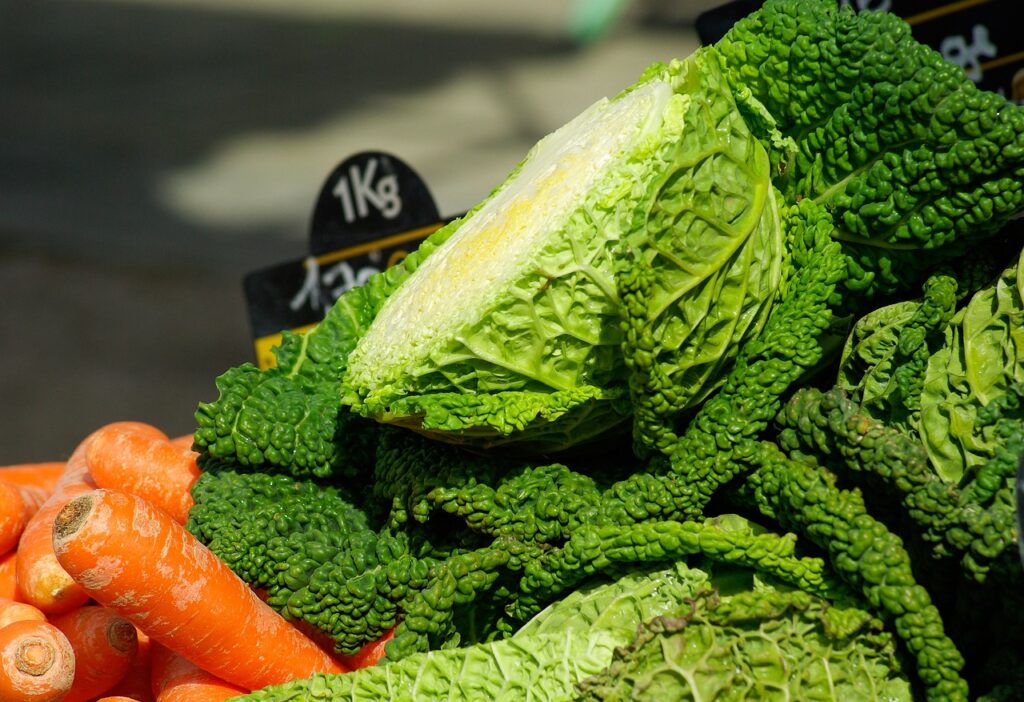If you’ve been overlooking cabbage at the grocery store, it’s time to give it a second thought. Despite its mild flavor and funky smell when cooked, cabbage is a cruciferous vegetable that is related to popular produce like kale and cauliflower. In fact, it’s chock-full of essential nutrients that can benefit your health in numerous ways.
In this article, you’ll learn about the impressive health benefits of cabbage and ways to incorporate more of it into your diet. From boosting your immune system to aiding in digestion, cabbage has a lot to offer. So, keep reading to discover how this underrated vegetable can improve your overall health and well-being.

Cabbage Nutrition Facts
If you’re looking for a low-calorie and nutritious addition to your diet, cabbage is a great option. A one-cup serving of shredded raw cabbage contains only 17.5 calories, less than a gram of protein, 4 grams of carbohydrates, and 1.8 grams of fiber. Additionally, cabbage is a good source of vitamins and minerals, including vitamin C, vitamin K, folate, zinc, potassium, and calcium. Its antioxidants can help protect your body from damage caused by free radicals.
Health Benefits of Cabbage
Cabbage is a cruciferous vegetable that is packed with nutrients and has numerous health benefits. Here are some of the reasons why you should add more cabbage to your diet:
It pumps the brakes on oxidative stress.
Oxidative stress is harmful to the body and can lead to chronic conditions such as diabetes, cancer, and heart disease. Cabbage is rich in antioxidants such as polyphenols and glucosinolates that work to neutralize free radicals, ultimately defending the body against oxidative stress.

It reduces inflammation.
Cabbage contains sulforaphane, a compound that reduces inflammation by acting on pro-inflammatory pathways in the body. Research has also shown that sulforaphane may regulate anti-inflammatory genes and lower pre-inflammatory proteins. As the antioxidants in cabbage fight oxidative stress, they also quell inflammation, which is involved in pain, swelling, and myriad chronic diseases like arthritis, cancer, and cognitive disorders.

It contains immune-boosting nutrients.
Cabbage is packed with vitamin C, an essential nutrient that supports the body’s defense mechanisms by boosting the production of white blood cells, which are crucial for fighting off infections. It also acts as an antioxidant, fighting off free radicals that can weaken the immune system. Cabbage also contains other vital nutrients for the immune system, including vitamin A and zinc.

It keeps your eyes healthy.
Cabbage is an excellent source of lutein and zeaxanthin, which are antioxidants that protect the eyes from ultraviolet (UV) light. This is key because UV light can cause oxidative stress in the retina, increasing the risk of age-related macular degeneration and vision issues.

It contains fiber for a healthy gut.
Cabbage is a stellar source of fiber, including both soluble and insoluble fiber, which are both needed for optimal gut health. Soluble fiber acts as a prebiotic, meaning it “feeds” good bacteria in the gut. Meanwhile, insoluble fiber adds bulk to stool, helping promote regular bowel movements and reducing constipation. Together, both fibers pave the way for more comfortable number twos and a healthier gut microbiome.

It’s good for the heart.
Cabbage contains soluble fiber, a nutrient that helps your body excrete cholesterol, potentially preventing high blood cholesterol, a major risk factor for heart disease. Cabbage also contains potassium, an essential mineral that regulates blood pressure. Potassium works by counteracting the effects of sodium and relaxing the blood vessels, which can stave off high blood pressure. Cabbage antioxidants work against inflammation and oxidative stress, both of which can fuel the development of heart disease.

It strengthens the bones.
Cabbage provides vitamin K, a nutrient that helps the body absorb calcium, which is the main mineral needed to build strong bones. It’s also needed to form “bone proteins, which keep bones strong and reduce the risk of fractures.

It has key nutrients for pregnant people.
Cabbage is high in folate, also known as vitamin B9, which is needed to make red and white blood cells, as well as DNA. It also aids the development of the central nervous system in a growing fetus, which can prevent neural tube defects—i.e., serious birth defects that affect the brain, spine, or spinal cord.

Side Effects & Risks of Eating Cabbage
Cabbage is generally considered safe to eat for most people. However, there are some potential side effects and risks to keep in mind. If you are taking blood-thinning medications, you should be cautious about consuming cabbage as the vitamin K in cabbage may interfere with the drug. If you are new to cabbage and have a history of food allergies, especially cruciferous vegetables, it is recommended to consult with your doctor before adding it to your diet.
Some people may experience difficulty digesting cabbage, particularly when it is raw, due to its indigestible carbohydrates that ferment in the gut, leading to bloating or gas. If you are prone to these symptoms or do not typically eat a lot of vegetables, it is recommended to start with a small amount of cabbage and gradually increase your intake. Cooking cabbage may also make it easier to digest.
It is important to be aware of these potential side effects and risks when incorporating cabbage into your diet. If you experience any adverse reactions, it is recommended to consult with your doctor.









